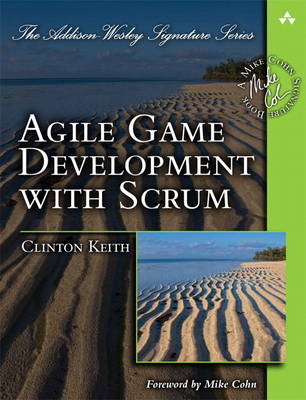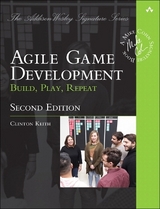
Agile Game Development with Scrum
Addison-Wesley Educational Publishers Inc (Verlag)
978-0-321-61852-8 (ISBN)
- Titel erscheint in neuer Auflage
- Artikel merken
Game development is in crisis—facing bloated budgets, impossible schedules, unmanageable complexity, and death march overtime. It’s no wonder so many development studios are struggling to survive. Fortunately, there is a solution. Scrum and Agile methods are already revolutionizing development outside the game industry. Now, long-time game developer Clinton Keith shows exactly how to successfully apply these methods to the unique challenges of game development.
Keith has spent more than fifteen years developing games, seven of them with Scrum and agile methods. Drawing on this unparalleled expertise, he shows how teams can use Scrum to deliver games more efficiently, rapidly, and cost-effectively; craft games that offer more entertainment value; and make life more fulfilling for development teams at the same time.
You’ll learn to form successful agile teams that incorporate programmers, producers, artists, testers, and designers—and promote effective collaboration within and beyond those teams, throughout the entire process. From long-range planning to progress tracking and continuous integration, Keith offers dozens of tips, tricks, and solutions—all based firmly in reality and hard-won experience.
Coverage includes
Understanding Scrum’s goals, roles, and practices in the context of game development
Communicating and planning your game’s vision, features, and progress
Using iterative techniques to put your game into a playable state every two to four weeks— even daily
Helping all team participants succeed in their roles
Restoring stability and predictability to the development process
Managing ambiguous requirements in a fluid marketplace
Scaling Scrum to large, geographically distributed development teams
Getting started: overcoming inertia and integrating Scrum into your studio’s current processes
Increasingly, game developers and managers are recognizing that things can’t go on the way they have in the past. Game development organizations need a far better way to work. Agile Game Development with Scrum gives them that—and brings the profitability, creativity, and fun back to game development.
Clinton Keith is an independent agile coach and Certified Scrum Trainer who helps game developers and nongame developers alike adopt Scrum, Extreme Programming, kanban, and other agile practices to greatly improve their productivity, workplace, and product quality. Over the course of 25 years, Clint has gone from programming avionics for advanced fighter jets and underwater robots to overseeing programming for hit video games such as Midtown Madness and Midnight Club. Clint has been a programmer, project director, CTO, and director of product development at several studios. Through a series of presentations and his popular blog, Clint introduced the video game industry to Scrum in 2005. As CTO, Clint helped High Moon Studios achieve a place on IT Week Magazine’s Top 50 Technology Innovators list in 2005 and 2006 and win several of San Diego Society for HR Management’s Workplace Excellence Awards in 2005, 2006, and 2007. For more information, visit www.ClintonKeith.com.
Part I: The Problem and the Solution
Chapter 1: The Crisis Facing Game Development
Chapter 2: Agile Development
Part II: Scrum and Agile Planning
Chapter 3: Scrum
Chapter 4: Sprints
Chapter 5: User Stories
Chapter 6: Agile Planning
Part III: Agile Game Development
Chapter 7: Video Game Project Planning
Chapter 8: Teams
Chapter 9: Faster Iterations
Part IV: Agile Disciplines
Chapter 10: Agile Technology
Chapter 11: Agile Art and Audio
Chapter 12: Agile Design
Chapter 13: Agile QA and Production
Part V: Getting Started
Chapter 14: The Myths and Challenges of Scrum
Chapter 15: Working with a Publisher
Chapter 16: Launching Scrum
Conclusion
Bibliography
Index
| Erscheint lt. Verlag | 3.6.2010 |
|---|---|
| Reihe/Serie | The Addison-Wesley Signature Series |
| Verlagsort | New Jersey |
| Sprache | englisch |
| Maße | 179 x 230 mm |
| Gewicht | 610 g |
| Themenwelt | Informatik ► Software Entwicklung ► Agile Software Entwicklung |
| Informatik ► Software Entwicklung ► Spieleprogrammierung | |
| ISBN-10 | 0-321-61852-1 / 0321618521 |
| ISBN-13 | 978-0-321-61852-8 / 9780321618528 |
| Zustand | Neuware |
| Informationen gemäß Produktsicherheitsverordnung (GPSR) | |
| Haben Sie eine Frage zum Produkt? |
aus dem Bereich



